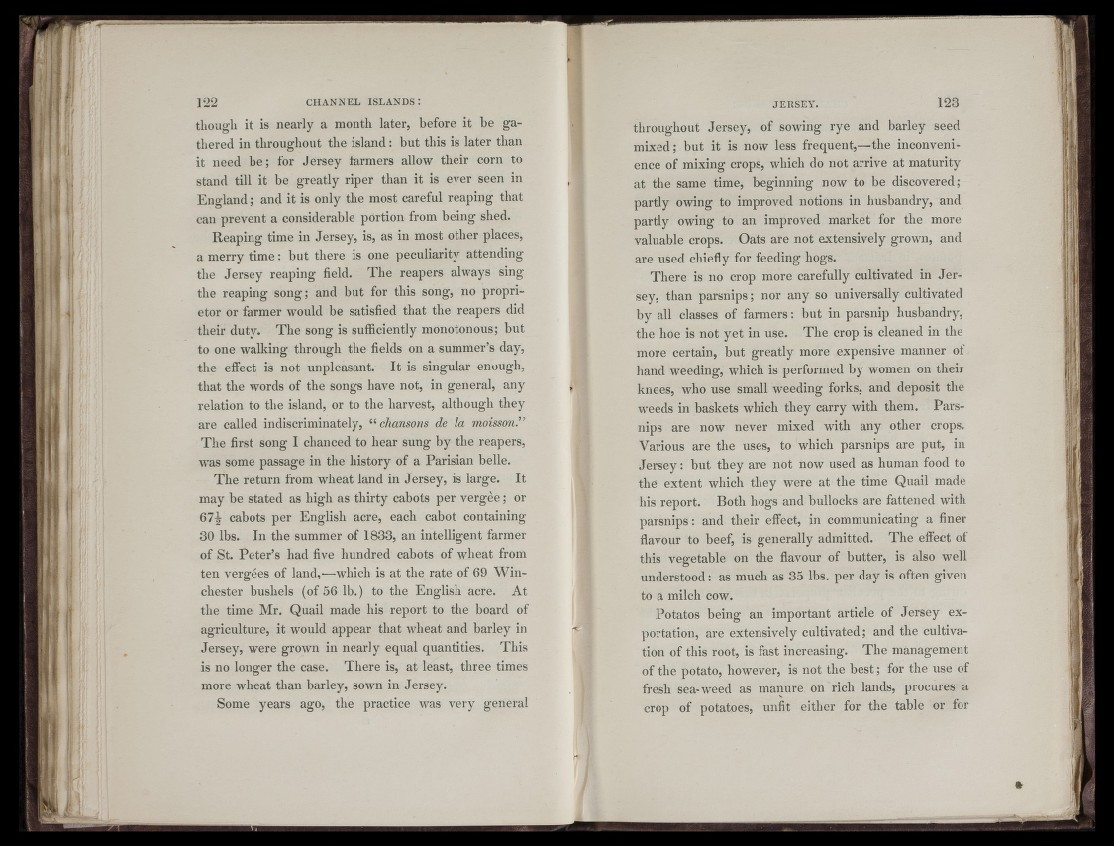
122
tliougli it is nearly a month later, before it be gathered
in throughout the island : but this is later than
it need be; for Jersey farmers allow their corn to
stand till it be greatly riper than it is ever seen in
England ; and it is only the most careful reaping that
can prevent a considerable portion from being shed.
Reaping time in Jersey, is, as in most other places,
a merry time : but there is one peculiarity attending
the Jersey reaping field. The reapers always sing
the reaping song; and but for this song, no proprietor
or farmer would be satisfied that the reapers did
their duty. The song is sufficiently monotonous; but
to one walking through the fields on a summer’s day,
the effect is not unpleasant. It is singular enough,
that the words of the songs have not, in general, any
relation to the island, or to the harvest, although they
are called indiscriminately, “ chansons de la moisson."
The first song I chanced to hear sung by the reapers,
was some passage in the history of a Parisian belle.
The return from wheat land in Jersey, is large. It
may be stated as high as thirty cabots per vergée ; or
6?T cabots per English acre, each cabot containing
30 lbs. In the summer of 1833, an intelligent farmer
of St. Peter’s had five hundred cabots of wheat from
ten vergées of land,—which is at the rate of 69 Winchester
bushels (of 56 lb.) to the English acre. At
the time Mr. Quail made his report to the board of
agriculture, it would appear that wheat and barley in
Jersey, were grown in nearly equal quantities. This
is no longer the case. There is, at least, three times
more wheat than barley, sown in Jersey.
Some years ago, the practice was very general
'H?
11. ■
throughout Jersey, of sowing rye and barley seed
mixed; but it is now less frequent,—the inconvenience
of mixing crops, which do not arrive at maturity
at the same time, beginning now to be discovered;
partly owing to improved notions in husbandry, and
partly owing to an improved market for the more
valuable crops. Oats are not extensively grown, and
are used chiefly for feeding hogs.
There is no crop more carefully cultivated in Je rsey,
than parsnips ; nor any so universally cultivated
by all classes of farmers : but in parsnip husbandry,
the hoe is not yet in use. The crop is cleaned in the
more certain, but greatly more expensive manner of
hand weeding, which is performed by women on their
knees, who use small weeding forks, and deposit the
weeds in baskets which they carry with them. Parsnips
are now never mixed with any other crops.
Various are the uses, to which parsnips are put, in
Jersey : but they are not now used as human food to
the extent which they were at the time Quail made
his report. Both hogs and bullocks are fattened with
parsnips; and their effect, in communicating a finer
flavour to beef, is generally admitted. The effect of
this vegetable on the flavour of butter, is also well
understood : as much as 35 lbs. per day is often given
to a milch cow.
Potatos being an important article of Jersey exportation,
are extensively cultivated; and the cultivation
of this root, is fast increasing. The management
of the potato, however, is not the best ; for the use of
fresh sea-weed as manure on rich lands, procures a
crop of potatoes, unfit either for the table or for